Zach Levy went from one extreme to the next in a few innings.
Levy, catcher for the Central Spartans of St. Peters, Mo., an American Legion team visiting for the Wood Bat Invitational, started the tournament off with a walk-off homer to give the Spartans a win over Warrensburg Post 131.
A few innings later, he was being rushed to the nearest dentist.
In the second game of their doubleheader, the Spartans took on the Lansing (Kan.) Post 411 Cavalry. Levy would only make it to the sixth inning. He would leave the game with two broken front teeth, one of which was completely shattered.
“It was kind of outrageous,” Levy said. “It just caught me way off guard.”
The pitch was fouled back. But instead of hitting Levy’s glove, it hit his facemask. The mask then broke, sending the metal bracket into Levy’s mouth, busting his lip, nose, and teeth.
“It just threw my head back,” he said. “I kinda felt these rock particles in my mouth and hoped it was dirt or something. But I felt around my mouth with my tongue and realized my tooth was gone.”
Levy didn’t know what had happened.
“I was shocked at first. I was pretty dazed.”
Luckily for him, Blue Springs Post 499/Fike assistant coach Matt Haggerty came to the rescue. Haggerty just happens to be a dentist when he’s not coaching the bases for Fike.
“I went over and looked at the kid and saw a red hole where the tooth was cracked – and I knew that wasn’t good,” Haggerty said.
That red hole was the tooth’s nerve ending. That sent Zach’s mother, Karen, completely over the edge.
“He couldn’t do anything. He couldn’t drink water because the nerve ending was showing,” she said. “We didn’t know what to do. We’re from out of town. We didn’t know anybody.”
Haggerty led them into the tournament room and iced the mouth of Levy. Although he couldn’t do anything, because Fike was scheduled to play next, Haggerty did know somebody that could.
“I called Drs. Zack and Don Meiners in Independence – a father/son dentist team. They said to get him up there and they performed a root canal. I heard they were really great to the young man,” Haggerty said.
Karen, although distressed, was elated to see the Dr. Donald Meiners and his staff standing at the door, waiting for them.
“I almost cried to see they stopped what they were doing at the end of the day to stay for complete strangers and rushed Zach right into the chair,” she said. “They never asked once about our dental or medical insurance information. As far as they knew, we didn’t have any. They were only concerned with one thing: caring (for) and fixing my son.”
Zach was surprised by the amount of care he got as well.
“It was unbelievable,” he said. “We just walked right in and they took care of me.”
Meiners was just happy to help.
“I said, ‘Let’s help out this kid.’ And that’s what we did,” he said. “Dana Callahan, Lori Lappert, all my staff, they did a great job in helping out the family.”
Karen was stunned at the lack of concern for the business side of the situation by Dr. Meiners.
“It wasn’t until long after the care was being provided they asked if we had insurance, which we do, and even so, they were not concerned if we were good for our bill,” Karen said.
“That’s kind of the way we work around here,” Dr. Meiners replied.
After the storm of pain and worry had calmed, Zach thought of his team. Being the only catcher on the team, he assumed the worst.
“I thought we would’ve had to forfeit or cancel the tournament.”
That was not the case.
The next day, the Central Spartans took the field against Hi-Boy Drive In/Post 340, with Zach starting at catcher.
“I had a temporary filling and wore a mouthpiece and played the next game,” he said.
After the Spartans game on Friday, the Levys went back to Dr. Meiners office for what turned out to be their last visit.
Levy returned for the rest of the tournament, but not without getting a few new nicknames from his teammates.
“They called me Lloyd Christmas from Dumb and Dumber, they called me Chip,” Levy said, chuckling. “They had some laughs with me.”
Levy is considering a career in hockey now, as well.
“I’m thinking about it,” he said, jokingly. “I definitely felt like a hockey player.”
The Levys are now home, and Zach is “feeling great.” But Karen will always remember the kindness she and her son were shown in Eastern Jackson County.
“People at the park asked me over and over again how Zach, or that catcher with the broken tooth, is doing,” Karen said. “It was just so amazing to see the amount of care and attention we received.”
Monday, October 12, 2009
CBS Early Show has segment on Teeth Grinding
(CBS) Stressed out at work? Your teeth might be getting the brunt of your worrying. Dentists all over the country are reporting that they're seeing more patients suffering from teeth grinding - and they're attributing it to the recent economic woes.
CBS Medical Correspondent Dr. Jennifer Ashton shared some warning signs for teeth grinding and some possible treatments for it with Early Show co-anchor Harry Smith.
According to Ashton, teeth grinding (or bruxism) isn't just limited to the teeth, and can affect surrounding areas.
Some of the telltale signs that you might be grinding are:
• Headache
• Oversensitive teeth
• Sore facial muscles
• Jaw pain
• Damage to the inside of the cheek
Dentists are noticing increases from 20 percent to a doubling of bruxism cases, and they suspect the economy's to blame.
Teeth grinding can be caused by stress and anxiety. It often occurs during sleep and can be caused by an abnormal bite or missing or crooked teeth.
According to The New York Times, one dentist reported 20-25 percent increase over a year. Another said teeth-grinding cases have doubled in the past 18 months.
Sometimes people find out they're grinding their teeth because their wife or husband hears it at night, but for others, it can be silent.
According to the American Dental Association, many people are unaware that they grind their teeth because they do it while they sleep.
ADA: Teeth Grinding (Bruxism)
Bruxism often occurs at the early part of the night and can disturb sleep partners. The clenching and grinding may be audible. Others make no sound while bruxing their teeth and do not realize they are doing it until a dentist discovers unusual wear spots on their teeth.
Teeth grinding can do all kinds of damage to your teeth. It can fracture or loosen your teeth and it can wear down the cusps of your teeth down to flat stumps.
Repairing this damage (treatments include bridges, crowns, root canals, dentures and implants) can be very costly. Some patients could also develop TMJ (temporomandibular joint syndrome). In severe cases it can affect your ears and result in hearing loss.
So, what are some ways you can combat the wear-and-tear on your teeth?
MOUTHGUARDS, WASHCLOTH:
• FREE: Relax your jaw muscles at night by holding a warm washcloth against your cheek in front of your earlobe.
• LEAST EXPENSIVE: OTC MOUTH GUARDS ($20) You can buy them at your local drugstore, but dentists say they might not fit your teeth properly and you could grind through them a lot more quickly.
• MODERATELY EXPENSIVE: CUSTOM NIGHT-GUARDS (starts at $350-$1000) You will have to go to the dentist for a custom fitting. Studies have shown that they can break the grinding habit.
NOTE from Dr. Zach: Our mouthguards are near the very bottom of this range in price - they are a great value.
• EXPENSIVE: BOTOX ($500 a treatment, every five months or so) Some dentists are starting to use this for extreme cases. It's off-label use and is for extreme cases of teeth-grinding, and it should be done by clinicians who know how to use it.
Our View: I wrote an entry on night guards that you can read here: LINK
I think night guards are an excellent investment for your teeth considering all the damage i see from grinding. It can be difficult for people to notice their teeth wearing down when they see their own teeth every day. Most of the time I only get patients asking about mouthguards when they have pain. Mouthguards can do an excellent job of saving your teeth and preventing expensive treatment to repair the ill effects of bruxism.
Tuesday, August 18, 2009
Coincidence? Independence Examiner writes about mouthguards.
Here is their article:
http://www.examiner.net/health/x772305218/Be-sure-to-protect-their-mouths-during-sports
There are between 650,000 and 2 million sports-related dental and oral injuries annually. Many sports, including football, require mouth guards for protection, but most do not. What do you know?
True or false
1. Mouth guards protect against concussion.
2. Missouri high school soccer requires mouth guards.
3. Missouri high school baseball requires mouth guards.
Mouth guards are intended to protect teeth from fracture and avulsion. They also protect lips, tongue and gums.
A properly fitted guard should stay in place during physical activity, be easily removed and not interfere with breathing or talking according to the American Dental Association.
There are 3 types of mouth guards: stock; boil and bite and custom-fitted. Stock guards are one-size-fits-all devices which are ready to wear.
Unfortunately, they are the least protective and most poorly-fitted of any of the guards. Stock guards are, however, the most inexpensive and easily found for less than 5 dollars. ‘Boil and bite’ guards are very malleable when heated in boiling water making them easily formed to teeth. They fit very well, if directions are followed. Boil and bite guards offer good protection and are moderately priced, usually less than 20 dollars. The most expensive, but most protective, are custom-fitted guards.
These are formed and fitted by a dentist and are better than any off the shelf version. Also, they can often last through several seasons.
Although not required, the use of a mouth guard in basketball and any contact and collision sport is strongly urged by most sports medicine societies. High school softball, a fall sport in Missouri, does not require mouth guards.
However, all players should consider using them. It is frightful to see a line drive speeding toward the face of a girl playing third base 25 feet or closer to the batter.
First basemen (women?!) and batters are also at high risk. There are guards designed specifically for girls and women with smaller and narrower gums than boys.
There have been many assertions that mouth guards prevent concussions. They do not.
There is no good scientific evidence to support these claims. There is no question they protect teeth and mouth.
If you participate in any contact or collision sport, ask your dentist about mouth guards, even if your sport does not require it.
Common sense should prevail over any particular sports-specific rule. An ounce of prevention is certainly worth a pound (or thousands of dollars) at the emergency department or dentist’s office. Athletes are more beautiful when they have all of their teeth and no stitches.
It’s not wimpy to wear a mouth guard, its smart.
Be a trendsetter.
Answers
1. F 2. F 3. F
Follow Up Article in Independence Examiner about Meiners Dentistry
http://www.examiner.net/letters/x695083591/During-a-moment-of-crisis-Independence-cared-helped
We were in from St. Louis for the recent Wood Bat Tournament in Independence, and a tipped ball shattered the tooth of my son, Zach Levy, the catcher for the Spartans.
As he spit blood and caught his balance, people ran for ice as I ran to see him. The Fike team was up to play next and their coach – Dr. Matt Hagerty, a dentist – ran to Zach. He said the nerve of the tooth was showing and said for us to get him to someone quickly. I said I was from out of town and asked for directions to the hospital.
He took me to a room at the park, and they calmed me down. The dentist made some calls and said, “I can’t take care of your son because our team is about to go out, but my partner across the street just said he will take you if you want.”
I was very nervous about not knowing these people but felt good with how we had been treated so far, so we went one exit away to Noland Road, walked into Dr. Donald Meiners’ dental office, and they were standing at the door waiting for us. I almost cried to see they stopped what they were doing at the end of the day to stay for complete strangers and rushed Zach right in to the chair.
We had two office workers giving my husband and I water, patting our shoulders to calm us. The doctor, his son (a dentist with the same practice, also named Zach), and the assistant all rushed to examine my son Zach. They never even asked us once about our dental or medical insurance info. As far as they knew, we didn’t have any, they were only concerned with one thing – caring for and fixing my son.
I have never had such wonderful and quick attention from any health-care provider, even when my two kids tore their ACLs. I couldn’t believe how absolutely kind, caring, gentle and professional they were. Long after the care was being provided they asked if we had any insurance, which we do, and even so they were not concerned if we were good for our bill. Wow – I couldn’t believe the dollar value was not a concern at that time.
The doctor called us in the room with Zach as they did all the examining work and explaining our next steps to repair his teeth. He cracked the other front tooth also. The office sent us off with snack for Zach, and set aside time at the end of the day on Friday to continue the repair and bond a new tooth. Unbelievable – the good people at the ballpark, the dentist coach of Fike who set this all up and gave initial care to Zach, then the incredible kindness and care we received from Dr. Meiners.
We were treated by all as travelers and, everyone pulled together to care for my son so well. People at the park have asked me over and over how Zach, or that catcher with the broken tooth, is doing. Also, Zach hit the walk-off home run on field 1 just prior to the second doubleheader game at field 2 where he was hurt.
Karen Levy and her family live in St. Peters, Mo.
Wednesday, July 22, 2009
Meiners Dentistry Recognized in Independence Examiner
Tuesday, May 12, 2009
Sports Mouthguards - Protect Your Teeth!
There are several types of mouthguards on the market.
The most popular type of mouthguard is referred to as the "boil and bite" mouthguard made at home by purchasing a cheap rubber mouthguard, boiling it in water and biting into it to make a mold of your teeth.
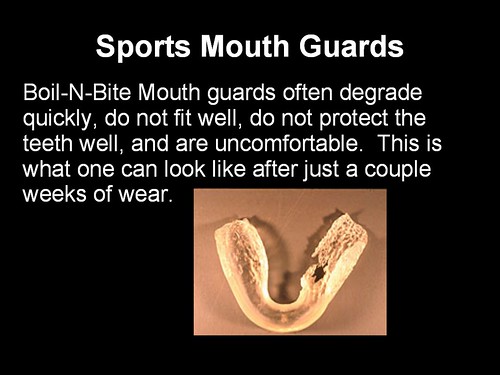
Dentists can also make mouthguards using a mold of the teeth
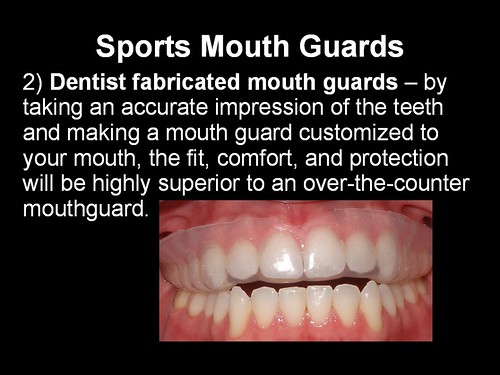
A dentist-made mouthguard is a great idea for all types of sports. Football, basketball, soccer, hockey, and even sports like skateboarding or martial arts.
Well made mouthguards are comfortable. Comfortable mouthguards get used, and no mouthguard is effective if it is torn up, uncomfortable, or does not cover and protect the teeth.
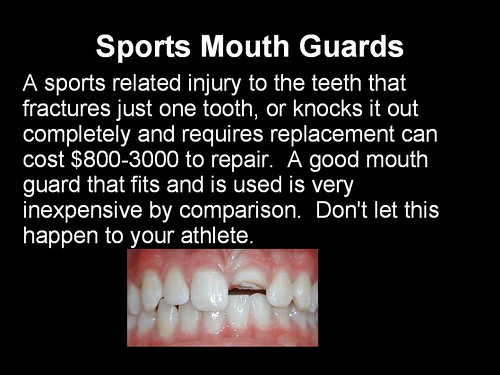
Protect your teeth from tooth grinding!
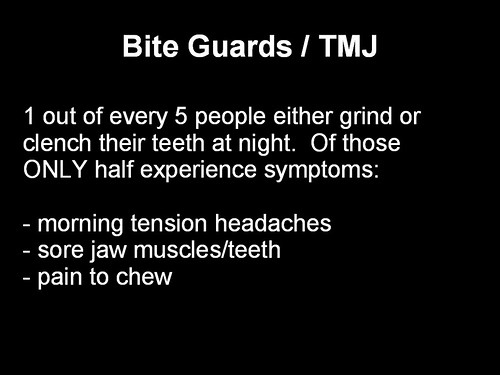
Those that experience symptoms tend to seek out treatment and normally get a biteguard made to alleviate the problem.
However, the half that don't have symptoms don't perceive a problem because the damage to the teeth occurs so slowly over time that when looking in the mirror you don't notice from one week or month to the next. These people don't seek treatment and often turn down a recommendation to get a biteguard due to lack of perceived need.
Even furthering the problem is the fact that many dental insurances won't cover a biteguard so treatment is denied due to cost and we slowly watch people's teeth erode away.
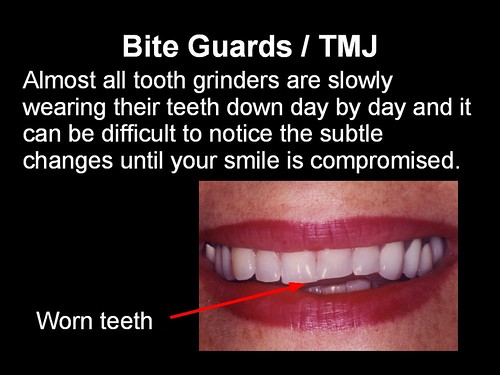
Biteguards are custom made for your mouth by using dental impressions. At the first appointment we take an upper and lower impression. Then it takes a couple days to get the biteguard made and then there is about a 30 min appointment to seat the biteguard and ensure it fits snug and is harmonious with your bite.
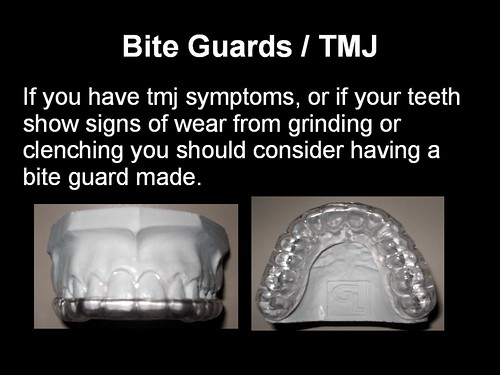
Biteguards also have the added bonus as working as a retainer for your upper teeth as well. An investment in a biteguard is you have signs of tooth wear is a wise one. Biteguards may not be cheap, but they can be a FRACTION of the cost to fix worn down front teeth years later.
Bad Habits That Destroy Teeth
2) Brushing Too Hard / Toothpaste Abuse - if you constantly are changing toothbrushes or if you buy medium or hard bristle brushes, or if the bristles on your brush splay out to the sides, you are brushing too hard. The combination of this bad habit + the use of today's abrasive whitening toothpastes can lead to forced gum recession, sensitive teeth, and even enamel breakdown. Seems that in general people that do this have an obsession with a clean feeling in their mouth and that feeling is derived from abusing the gums. There is also a feeling that if they brush harder their teeth will be whiter, when actually the opposite occurs because as you wear away enamel, teeth get darker.
3) Fingernail Biting - Another bad habit that destroys the enamel on the front teeth and wears the teeth down. Teeth weren't designed to chew nails, and over time the nails keep growing back, but the teeth just get worn down never to grow back again.
4) Ice Chewers - Crunching on something hard that is at an extremely different temperature than the body is really hard on teeth. It's even harder on dental work, especially white fillings and sealants.
5) Pen/Pencil Chewers - Just like with fingernail biting, your front/side teeth take a beating when you do this. Doing anything teeth weren't designed to ultimately harms them.
6) Popcorn kernel crunchers - several people out there like to crunch on the slightly popped or un-popped popcorn kernels. This isn't much better than chewing on rocks. These things are EXTREMELY hard and I've seen several cracked molars on people with that habit.
Wednesday, April 29, 2009
Why do I need X-rays?
1) Between the teeth
2) Beneath the roots of the teeth and in the bone surrounding the teeth.
3) Inside of a tooth
To properly diagnose problems that occur in those areas we need to see those areas, which can only be done with x-rays.
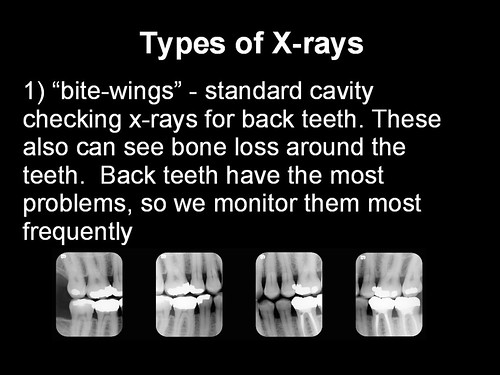


X-Rays allow us to do a thorough job checking your teeth. Without them we can only see the tooth surfaces that are visible. Many problems with the teeth originate in areas that we cannot see.
The #1 area for cavities on back teeth is on the biting surfaces of the teeth, which we can see visually. But the #2 area for cavities is in between the teeth. Those only become visible when the decay inside the tooth is large and has eaten away a big portion of the tooth.
On front teeth the #1 area for tooth decay is in between the teeth.
Meiners Dentistry has gone all digital on all types of x-rays now.
The benefits of that are:
#1) Low Radiation needed to capture the same quality of image that we used to get with film.
#2) Fast results. It doesn't take 5-7 minutes to process the x-rays anymore.
#3) It means we've gone "green" - no more chemicals used to process the x-rays, and less waste.
White Fillings vs. Silver Fillings
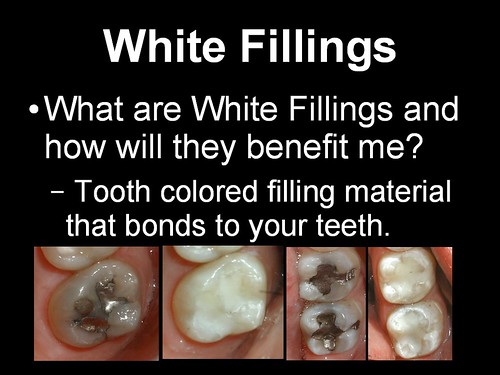
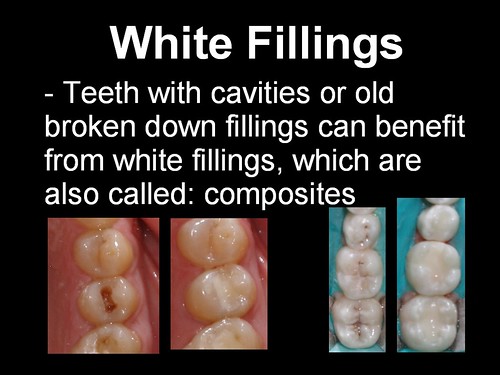
You have choices today when it comes to getting cavities in teeth filled. White fillings aren't new. In fact they've been around for a long time, but the technology used to chemically bond them to your teeth keeps improving all the time. The actually white filling material (composite resin) itself has also gotten stronger with advancements.
Many people think that they have done away with the old silver filling material - not true!
Here are some pros and cons to silver vs. white fillings:
White Fillings:
Advantage:
- looks like your tooth! - probably advantage #1, they really look GREAT!
- chemically bonds to the tooth to seal the filling in (silver fillings are just "packed in)
- repairable if some chips away because new material can stick to the old material
Disadvantage:
- not as strong as silver filling material (metal is still stronger than resin)
- more expensive than silver material (materials are more expensive, and they take longer to do)
- need an absolutely dry surface (no saliva or blood) to place the material for it to be successful. This can make using it very challenging on a lower tooth in the back of the mouth near the tongue, on an antsy child (or adult), or in other hard to reach areas.
- In an effort for dental insurance companies to reduce benefits (this is for BACK TEETH ONLY), if you select a white filling on a back tooth, many insurance companies will downgrade your benefit to a silver filling (because they are less expensive).
Example: The standard dental insurance pays 80% on regular fillings.
So let's say a White Fillings is $120 and a silver filling is $100
If you get a white filling, the insurance pays 80% of the $100 silver filling fee instead of on the $120 White Filling fee.
Your co-pay would be $20 on the silver filling, but would be $40 on the white filling.
Silver Fillings:
Advantage:
- less expensive
- faster procedure
- long lasting
- not as sensitive as white fillings are to moisture, meaning they can be placed easily on kids with active tongues, and hard to reach areas.
Disadvantage:
- doesn't look good
- does not bond to the teeth
- not easily repairable (usually needs total replacement)
- silver filling material still contains a small percentage of mercury. Some people will proclaim this is a problem, but this material has been around for a very very long time with a lot of positive results.
- the small percentage of mercury does allow the filling material to expand and contract (like mercury in a thermometer), which if a filling is large, can weaken the tooth over time. It seems like I see more broken teeth with large silver fillings in them than anything else.
Lead and Bacteria found in Dental Crowns made overseas (we don't use overseas labs)
To give a little background. Dental Crowns and Bridges (as well as dentures and partial dentures) are not made by dentists, they are made at dental laboratories. Some dentists use labs right here in our metropolitan area (like we do), some use labs in other parts of the country. The problems spoken of in these articles are about crowns made in other countries, most commonly China.
Here are some of those stories:
http://www.myfoxchicago.com/myfox/pages/News/Detail?contentId=6078693&version...
http://www.dispatch.com/live/content/health/stories/2008/02/28/DentalLead.ART...
http://wwwphp.dispatch.com/vplayer.php?clip=2008_02_27_Denist_Work_To_Test.wmv
At Meiners Dentistry, we have ALWAYS and will continue to ALWAYS use local dental labs in the metropolitan area where we know the individuals making the dental prosthesis personally. We support the local economy, and would not participate with foreign laboratories in the name of cutting costs to increase profit margins.
We are proud of the relationships we've established our local dental labs, and feel they provide products with the finest workmanship and materials available. There's no question it costs us more, but it is the type of quality we would want for our own mouths, and those of our family, friends, and patients.
Whoopi Goldberg discusses gum disease on The View
Dental Erosion on Rise in U.S.
http://health.usnews.com/usnews/health/healthday/080312/dental-erosion-on-ris...
WEDNESDAY, March 12 (HealthDay News) -- Dental erosion -- the loss of the teeth's protective enamel -- is on the increase in the United States, researchers say.
"This study is important, because it confirms our suspicions of the high prevalence of dental erosion in this country and, more importantly, brings awareness to dental practitioners and patients of its prevalence, causes, prevention and treatment," study co-author Bennett T. Amaechi, an associate professor of community dentistry at the University of Texas Health Science Center at San Antonio, said in a prepared statement.Amaechi led the San Antonio portion of the study, which also included researchers at Indiana University and the University of California, San Francisco. They looked at 900 middle school students (aged 10 to 14), and found that about 30 percent of them had the condition.
Dental erosion is caused by acids found in many common products, including soft drinks, sports drinks, some fruit juices and herbal teas.
"When consumed in excess, these products can easily strip the enamel from the teeth, leaving the teeth more brittle and sensitive to pain. The acids in these products can be so corrosive that not even cavity-causing bacteria can survive when exposed to them," Amaechi said.
Regular use of some types of medications, such as aspirin, also may cause dental erosion. Certain medical conditions, such as acid reflux disease or eating disorders (such as bulimia) associated with chronic vomiting, can cause dental erosion because of the gastric acids that are regurgitated into the mouth.
"It is important for dental practitioners to identify the erosion and its causes before it is too late. Because dental erosion creates a smooth and shiny appearance of the enamel and causes no pain or sensitivity in its early stages, most patients are not aware that they are suffering from the condition until the problem becomes severe," Amaechi said.The findings were published in current issue of the Dental Tribune.http://www.simplestepsdental.com/SS/ihtSS/r.WSIHW000/st.32219/t.35262/pr.3.html
Dental Bonding - a conservative, affordable cosmetic makeover.
One procedure that doesn't get much media attention, but has been around for a long time, is half the cost of veneers, and is minimally invasive is called Dental Bonding.
It gets even better, Dental Bonding can also often be completed in just ONE appointment!!
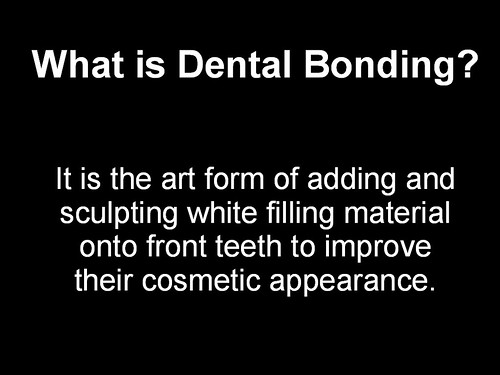
That's right, he same technology of white filling material in teeth can be "bonded" to your front teeth to improve appearance.
By comparison, Veneers are made by a dental laboratory and then those porcelain shells for your teeth adhere to your teeth.

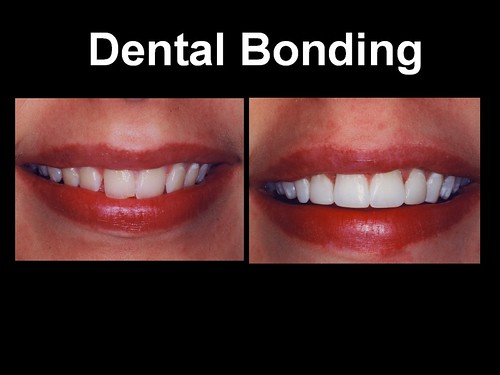
Notice the gap, and overlapping teeth on the left. Stunning!
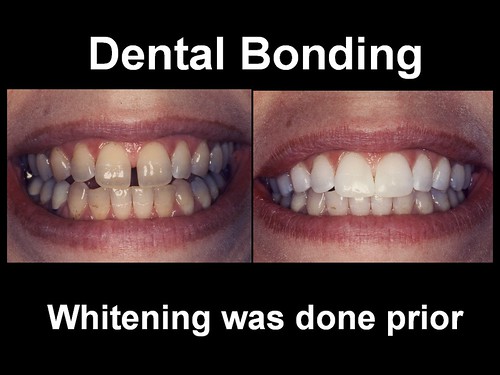
This person couldn't stop smiling after this was done.

This young girl almost never smiled before to hide her small teeth.

This young female sucked on lemons starting at a young age and she already exhibited a level of teeth wear we rarely see in anyone under 55. Bonding has given her a second chance.
If you would like to smile bigger and more confidently, it's possible bonding could be right for you!
Loose Dentures? We have found a cost effective solution!

If you've looked into getting implants to lock in your loose-fitting dentures and found that they're just too expensive, too surgical, and take too long to heal, we have got great news for you! We have been searching for years to find an easier way to provide our patients with locked-in dentures. Our search has lead us to discover an implant system that is not only a fraction of the cost of conventional implants, but many times there are no incisions or stitches, and there is no waiting for healing - you can wear your locked-in dentures home the very day the implants are placed. Absolutely unbelievable!
Stress Ravaging Men's Teeth
________________________________________________________________
Stress can turn your hair gray, send you racing to the kitchen to look for chocolate and send you to the emergency room with chest pains. Now you can add dental problems to the list of the bad things stress can do to you.
"Stress can lead to teeth grinding and jaw clenching, and that can lead to serious dental issues," said Jeffrey Weller, a Chicago dentist and founder of Weller Aesthetic & Restoration Dental Care. "People came into my office with serious destruction; cracked teeth, jaw pain. Their jaws click, and they can barely bite."
"Men, especially, are literally wearing out their teeth," Weller said, adding that stressed executives are the newest wave in patients seeking cosmetic dentistry. Women, according to Weller, may be under similar stress, but because of their more delicate muscle structure, they are less likely to cause as much damage.
"Men typically want pain relief, but there's no question they also like the cosmetic effect," Weller said. Cosmetic dentists are using combinations of crowns, veneers, bonding and implants to correct bite problems and reverse years of damage. The secondary result of a better-looking mouth is giving patients something else to smile about.
"Once people started whitening their teeth, it opened the door for the dentist to suggest more cosmetic procedures," said Anna Velten, marketing coordinator for the American Academy of Cosmetic Dentistry. "We're seeing it a lot more in men and even seeing more men on the cover of our journal."
Avoidance behavior
Dentists also say that men are much more likely to wait too long to seek help than women, so by the time they do go to the dentist, they have far more tooth destruction. "Men go for years with worsening jaw pain," Weller said. Many men never went to the dentist at all, agreed William Cohen, a Glenview dentist and accredited member of the AACD. "People are better educated about dental issues now," he said.
Both dentists agree that women look in the mirror and are more self-conscious about what they see, while it is just in the last few years that men have become attuned to the benefits of cosmetic dentistry. Both dentists also credit the TV show "Extreme Makeover" for much of the interest in cosmetic dentistry as well as the Baby Boomer generation, which wants a younger look.
A study done by the AACD in 2006 concludes that people with good teeth and a nice smile were considered more attractive and more intelligent. So, Weller said, is it any wonder that his office's full-mouth restorations, which can include porcelain veneers, crowns and implants, has increased tenfold. For patients who cannot afford the full-mouth rehab, which can cost up to $40,000 and is not covered by insurance, just fixing their bite can minimize the damage, ease the pain and make them look better.
Jason Kole, an emergency room doctor at St. James Hospital in Chicago Heights, went to Weller for routine dental work. "I was having a lot of jaw pain and severe headaches, Kole said. "I had been grinding my teeth since before medical school, but it had gotten worse, and the enamel was worn down." Kole said that the grinding improved dramatically after Weller changed the dynamics of Kole's jaw, a process that took a year.
Piecemeal isn't best
Weller said he tries to get patients who need full-mouth rehab done in four to five appointments, which can last from three to five hours, over 45 days. Because the nature of the work makes it difficult to fix one tooth at a time, a longer appointment works better.
Don Ratcliff of Scottsdale, Ariz., wasn't trying for the Hollywood look, although he had porcelain veneers on his front teeth. However, about three years ago his dentist discovered his back teeth were worn down from grinding, and Ratcliff was told he would eventually need dentures. "It was functionality for me," he said.
"Men react great when I talk to them about the functional aspect," Weller said. "I talk to them about the wear and tear, not about looking better. Once they understand, they are OK with cosmetic work." Cohen too said a patient often will come in for routine work that leads to a discussion of a chronic condition that can be fixed with cosmetic work.
"This is a life-changing procedure," Cohen said. "People who were self-conscious because of the appearance of their mouth come out of their shell. We take before and after photos, and you can see it in their eyes; they're a different person."
- - -
Some tools of the trade
Crowns -- Grinding your teeth, an improper bite, age, fillings and tooth decay can contribute to wearing down, cracking or breaking of teeth. Dental crowns cover the entire visible surface of the affected tooth and add strength, durability and tooth stability. In other instances, crowns are used to replace actual missing teeth. Crowns are anchored to the teeth on either side, with a bridge section connecting two crowns. Instead of bridges, single-tooth dental implants may be used that eliminate the need for supporting the crowns.
There are three basic types of crowns: gold; ceramic; and ceramic-veneered gold. Gold and metal-ceramic crowns are extremely durable and normally used in molars, where the forces from chewing and grinding are most prevalent. Ceramic crowns are used primarily for front teeth, because they can best resemble the natural tooth color.
Veneers -- Veneers often are used as an alternative to crowns. Veneers are thin pieces of specially shaped porcelain or plastic that are glued over the front of teeth with little or no anesthesia. They are used to fix teeth that are severely discolored, chipped, have small holes or pits, are misshapen or crooked. They also can repair uneven spaces. Veneers do not stain and last 10 to 15 years. They usually cost less than crowns.
Bonding -- Dental bonding is a procedure in which a tooth-colored resin is applied and hardened with a special light that "bonds" the material to the tooth to restore or improve a person's smile. Bonding is an option that can be considered to repair decayed, chipped or cracked teeth, improve the appearance of discolored teeth, close spaces between teeth, make teeth look longer or even change the shape of teeth. Little advance preparation is needed for dental bonding, and anesthesia is often not necessary unless the bonding is being used to fill a decayed tooth.
The surface of the tooth will be roughened and a conditioning liquid applied. These procedures help the bonding material adhere to the tooth. The tooth-colored, puttylike resin is then applied, molded and smoothed to the desired shape. An ultraviolet light or laser is then used to harden the material. The procedure takes about 30 to 60 minutes per tooth to complete. Typically, bonding material lasts from 3 to 10 years before needing to be touched up or replaced. Generally, bonding can range in cost from $200 to $400 per tooth.
Monday, April 27, 2009
Dry Mouth Syndrome
Chronic dry mouth (xerostomia) is a serious problem affecting millions of people throughout the world. Xerostomia can affect persons of any age, but it is much more prevalent in older adults.
It causes a wide range of problems including:
· difficulty in swallowing· loss of the ability to taste
· increased rate of tooth decay
· difficulty in speaking
· increase in oral infections It is estimated that approximately 30% of persons over the age of 65 suffer from dry mouth syndrome.
What causes dry mouth syndrome?
1) Medications (there is not enough space here to list them all, but here are some categories):
· antihistamines (like Benadryl)
· antidepressants (like Elavil, Flexaryl, etc)
· anticholinergics (decongestants – like atropine)
· Diet Pills (often have a lot of caffeine which removes water from your body)· antipsychotic (psychiatric drugs)
· anti-Parkinson agents, diuretics (“water pills”). sedatives (sleeping pills)
· Illegal recreational dugs
· Methamphetamines, cocaine, ecstasy
2) Medical Conditions
· Radiotherapy (radiation treatments for head and neck cancer)
· Uncontrolled diabetes
· Sarcoidosis
· Lupus· Sjorgrens’s sydrome (a disease which attacks saliva glands)
NOTE: Persons suffering from dry mouth syndrome also frequently suffer from bad breath. Bad Breath (halitosis) is a separate problem which has its own treatment protocol.
How can dry mouth syndrome be treated?
2) Limit sodium, caffeine, and alcohol (including mouthwashes with alcohol like Listerine/Scope) intake. These things also decrease saliva flow.
3) Biotene Products (dry mouth toothpaste, gentle mouthwash, dry mouth gum, and oral balance gel). These products contain enzymes of components found in natural saliva.4) Xylitol mints, candy, and gum often stimulate salivary flow, improve breath, and will not cause tooth decay.
5) Neutral sodium fluoride toothpaste (Prevident 5000). Prevident is high-fluoride toothpaste that guards teeth from decay and has the added benefit of stimulating saliva flow if used several times daily. This is only available by prescription.6) Saliva substitutes such as Roxane, Salavart, or Optimoist by Colgate, when used over a two week period can restore moisture. These are solutions that you simply pour in your mouth and it simulates saliva. They should be available at most drug stores.
- Saliva provides a "first defense" against chemical, mechanical, and infectious attacks
- It helps digest food
- It protects teeth from decay
- It prevents infection by controlling against an overabundance of bacteria and fungi in the mouth
- Without enough saliva you can lose your teeth to tooth decay at a very young age or develop other infections in the mouth. You also might not get the nutrients you need if you cannot chew and swallow certain food
Prescription options:
2) Evoxac (cevimeline HCl, 30 mg tablets) – also three times daily. Reportedly have less side effects.
Cavities in Baby Teeth on the Rise
A fabulous documentary on this was done by CBS and can be found here:
CBS Early Show Talk About Baby Teeth Cavities
as a side-note.. while I was on the CBS site, I found this documentary about toothbrushing as well:
CBS Early Show on Brushing Teeth.
The CDC on Monday released its latest report card on the nation's oral health. The report shows that about 28% of U.S. children aged 2-5 have cavities in their baby teeth. That's up from about 24% nearly a decade ago.
Data came from two national health studies that included interviews and oral health checkups.
The first study, conducted from 1988 to 1994, included more than 26,000 U.S. civilians. The second study, conducted from 1999 to 2004, included more than 25,000 U.S. civilians. The CDC compared the two studies, looking for oral health trends.
Overall, the CDC's report shows that oral health improved for most Americans between 1988 and 2004. For instance, dental cavities declined for every age group except children
aged 2-5, and the number of seniors losing all of their teeth continues to decline.
The statistics don't explain why dental cavities are rising in baby teeth. But the study shows that boys, non-Hispanic whites, and youths living in poverty were particularly affected.
"This report shows that while we are continuing to make strides in prevention of tooth decay, this disease clearly remains a problem for some racial and ethnic groups, many of whom have more treated and untreated tooth decay compared to other groups," the CDC's Bruce Dye, DDS, MPH, says in a CDC news release. Dye was among the researchers who worked on the CDC's report.
Worst Beverages for your Teeth
1) Lemonade
Lemonade is a dangerous combination of acid and sugar. The formula for tooth decay is: bacteria that cause cavities (which we ALL have in our mouth, yes, dentists included) + acid (to penetrate the hard enamel layer of the teeth) + sugar (what the bacteria feed on) = tooth decay. Lemons are one of the most acidic fruits there are. Combining this acidic fruit with sugar makes it a potent cavity causer.
Many of you have asked if a lemon slice in your water is bad. This is certainly not nearly as bad as lemonade because there isn't sugar involved, but it does make your water more acidic.
2) Energy Drinks (Red Bull, Rooster Booster, Full Throttle, etc.)
These are the newest latest craze in beverage consumption and these drinks are giving you more energy by ramping up the sugar and caffeine. Caffeine isn't hard on teeth, but these beverages are still harder on teeth than soda.
3) Sports Drinks (Gatorade, Powerade, etc)
People tell me all the time that they have cut down their soda consumption thanks to some of the "Stop the Pop" information we've had around the office. Unfortunately when I ask them what they switched to, it's almost ALWAYS Gatorade/Powerade. Gatorade/Powerade's marketing leads you to believe this is a healthier choice than soda, they always show images of it being good for replenishing you after a hard day or working or working out, and it doesn't have a fizz , or caffeine.
What they DO have in them though are additives and organic acids not found in soda that are very erosive to dental enamel because of their ability to breakdown calcium which is needed to strengthen teeth. And if this can harm your dental enamel think of what it may do to your bones, which are much softer than dental enamel.
4) Fitness Water (Propel, etc.)
"Wait a minute, you're saying water is bad too?" Well, no, fitness water has the same organic acids as the Gatorade (they are made by the same companies) and therefore do significant damage even without the sugar component. In many ways, fitness water is just diet Gatorade.
5) Iced Tea (sweetened is even worse)
I got some new information about iced tea recently which may please some of you. It seems that the canned iced teas are much worse than a home brewed iced tea (especially if you aren't adding a lot of sugar). I cannot find what about the canned iced teas makes them worse, but that is what the literature has to say. Part of this could be that Lipton/Snapple adds a lot more sugar to tea than you would at home. So if you are brewing your own tea and not adding sugar, it isn't bad for teeth. As a side note though, this has no basis in science, but it seems I see the WORST stains on people's teeth that tell me they consume Green Tea (which is a very healthy tea).
6) Soft Drinks (Coke, Pepsi, Mountain Dew, Dr. Pepper, Sprite, 7-up, etc.)
Most sodas have the following ingredients listed right on the can: Phosphoric Acid and High Fructose Corn Syrup (sugar). That pretty well sums it up, you are drinking a combination of acid and sugar, and that is what leads to tooth decay. The average 12 oz. can of soda has TEN teaspoons of sugar.
Diet Soda - Diet Soda does not have sugar, but does still have the same amount of phosphoric acid. Meaning its less bad, but still not great.
Clear Soda - For some reason it is perceived that Sprite, 7-Up, Fresca, etc. are a "healthier" choice than Coca-Cola or Pepsi. It is better in the sense that it won't stain your teeth, but they still have all the acid and all the sugar. It is not a healthier choice at all.
Alcoholic beverages - I was amused by those who wrote to thank me that beer wasn't on the list. And it's true, beer doesn't have sugar, and is significantly less acidic than soda/gatorade.
Wine is very acidic, it is probably the worst alcoholic beverages for teeth, especially since it is generally sipped over long periods of time (more on this in a minute).
Tonic Water is a pretty popular mixer for various spirits. People often forget this is basically a soda pop as well. It's sugary, and acidic. Consider Club Soda as a substitute, it's calorie free too.
The Margarita is another very acidic beverage with a lot of sugar in it as well.
The Missouri Dental Association (MDA) has been very proactive about helping kids and adults make healthy choices for their teeth. In fact, they started a program that other states have began to mimic called "Stop the Pop".
There is a wealth of information at the MDA website about stop the pop, including fun projects for children if you are involved in education.
An easy-to-read excellent brochure is here.
The article I took the following information from can be read here.
Hey, I really enjoy these beverages and can't quit. Now What?
Here are some tips for safely enjoying these beverages in moderation
1) Drink through a straw, it avoids the teeth a bit more that way.
2) Don't brush IMMEDIATELY after drinking the beverage. The enamel is a bit softer for 20-30 minutes after consuming a soda and your toothbrush could actually accelerate the wear. Wait a bit.
3) Don't sip all day.. just drink it! When you drink an acidic beverage the acid level (or pH) of your mouth drops. It takes your mouth about 20-30 minutes for that to recover. When you sip a beverage for hours, like the people that get a big gulp from a convenient store and then drink on it all day, the acid level of your mouth stays low ALL day, creating an optimum environment for the bacteria in your mouth that do cause cavities to work away on your teeth.
You would be better off (teeth wise) chugging a large soda fast, than sipping on a small glass all day.
4) Drink and rinse your mouth with water after consuming the beverage.
Think of this: Thousands of years ago humans didn't get many cavities. Wild animals don't get cavities with much frequency. Neither of these creatures has any better tooth enamel than we do, and certainly don't benefit from great toothbrushes, paste, and dental visits. Why? They consume meat, plants/vegetables, and drink water. With all the advances in oral health care, fluoride, sealants, xylitol, etc. you'd think we'd have tooth decay all but eliminated. Unfortunately what has kept that from happening is that the American diet includes over 100 lbs. of sugar every year, and people are drinking everything BUT water. Poor diet has more to do with tooth decay than inadequate personal oral care. The United States has a higher decay rate than other developed nations, but we have the best oral health care in the world. Why? We also consume the most soda, candy, and other sugary products.
American Heart Association changes guidelines for Antibiotics before Dental Treatment
http://www.ada.org/public/topics/antibiotics.asp
For decades, the American Heart Association(AHA) recommended that patients with certain heart conditions take antibiotics shortly before dental treatment. This was done with the belief that antibiotics would prevent infective endocarditis (IE), previously referred to as bacterial endocarditis. IE is an infection of the heart’s inner lining or valves, which results when bacteria enter the bloodstream and travel to the heart. Bacteria are normally found in various sites of the body including on the skin and in the mouth.
The AHA’s latest guidelines were published in its scientific journal, Circulation, in April 2007 and there is good news: the AHA recommends that most of these patients no longer need short-term antibiotics as a preventive measure before their dental treatment.The American Dental Association participated in the development of the new guidelines and has approved those portions relevant to dentistry. The guidelines were also endorsed by the Infectious Diseases Society of America and by the Pediatric Infectious Diseases Society.
The guidelines are based on a growing body of scientific evidence that shows the risks of taking preventive antibiotics outweigh the benefits for most patients. The risks include adverse reactions to antibiotics that range from mild to potentially severe and, in very rare cases, death. Inappropriate use of antibiotics can also lead to the development of drug-resistant bacteria.
Scientists also found no compelling evidence that taking antibiotics prior to a dental procedure prevents IE in patients who are at risk of developing a heart infection. Their hearts are already often exposed to bacteria from the mouth, which can enter their bloodstream during basic daily activities such as brushing or flossing. The new guidelines are based on a comprehensive review of published studies that suggests IE is more likely to occur as a result of these everyday activities than from a dental procedure.
The guidelines say patients who have taken prophylactic antibiotics routinely in the past but no longer need them include people with:- mitral valve prolapse
- rheumatic heart disease
- bicuspid valve disease
- calcified aortic stenosis
- congenital heart conditions such as ventricular septal defect, atrial septal defect and hypertrophic cardiomyopathy.
The new guidelines are aimed at patients who would have the greatest danger of a bad outcome if they developed a heart infection.
Preventive antibiotics prior to a dental procedure are advised for patients with:- artificial heart valves
- a history of infective endocarditis
- certain specific, serious congenital (present from birth) heart conditions, including
- unrepaired or incompletely repaired cyanotic congenital heart disease, including those with palliative shunts and conduits
- a completely repaired congenital heart defect with prosthetic material or device, whether placed by surgery or by catheter intervention, during the first six months after the procedure
- any repaired congenital heart defect with residual defect at the site or adjacent to the site of a prosthetic patch or a prosthetic device
- a cardiac transplant that develops a problem in a heart valve.
The new recommendations apply to many dental procedures, including teeth cleaning and extractions. Patients with congenital heart disease can have complicated circumstances. They should check with their cardiologist if there is any question at all as to the category that best fits their needs.
Patients and their families should also ask careful questions of their health care providers anytime antibiotics are suggested before a medical or dental procedure.The AHA guidelines emphasize that maintaining optimal oral health and practicing daily oral hygiene are more important in reducing the risk of IE than taking preventive antibiotics before a dental visit.
Moushwashes

There are so many choices in the oral health care isle of your grocery store, Wal-mart, or wherever you shop for dental supplies.
I can't possibly cover all of the choices or this entry would be way too long. However, I will break down the most popular brands and hopefully help you choose the product that will work the best for your mouth.
Not all mouthwash was created equally; different mouthwashes have different benefits.
I am going to break the mouthwashes down into these categories:
1) anti-gingivitis 2) anti-cavity 3) for dry-mouth 4) pre-brush rinses 5) for bad breath 6) whitening rinses
1) Anti-Gingivitis
a) Listerine - This mouthwash has been around for a long time and has had the American Dental Association seal for fighting plaque and gingivitis for a long time.
- is great if you have gingivitis (bleeding gums) and collect a lot of plaque around your teeth.
- the new citrus or vanilla mint (less "harsh") flavors do perform at the same level as the mint and peppermint flavors. All the flavored varieties are equally effective to the old brown flavor from long ago.
- contains a high level of alcohol in it: nearly 22%. Alcohol dries out the mouth, which can be very negative if you already have trouble with dry mouth. Some researchers have also shown high alcohol has a negative effect on white fillings.
b) Crest Pro-Health - This is a newer mouthwash that Crest came out with as an alternative to Listerine. The benefits are that Crest Pro-Health doesn't have any alcohol and therefore does not have the harsh taste or drying of the mouth. It kills germs using an ingredient called Cetylpyridinium Chloride. Crest Pro-Health is a very promising product, but does not have the longevity, or years of results to back it up like Listerine.
There are some prescription strength mouthwashes for gingivitis that I will discuss later.
2) Anti-Cavity
a) Act - This mouth rinse has also been around for a long time. It contains a 0.05% sodium fluoride, which if used daily can decrease the decay rate up to 50% in some studies. It is a great rinse for both adults and children that have had troubles with tooth decay, or are at risk for tooth decay.
b) Act Restoring Mouthwash - this is a version of Act that they are marketing to adults. This mouth rinse has the same amount of fluoride as the other rinse, the difference is that this rinse contains 11% alcohol to provide more of a breath freshening effect. This rinse is a great cavity fighter. If you are a teenager to adult that has no trouble with gingivitis, but are always fighting tooth decay. This is your rinse.
c) Listerine Tooth Defense - This is Listerine's brand new mouthwash that is their answer to Act. This rinse is not for children. It has the same nearly 22% alcohol content that the regular Listerine rinses have. Unfortunately it also only has HALF the fluoride content of the Act Restoring Mouthwash. It is a fine product, but Act Restoring would be a better choice for an adult anti-cavity rinse.
3) For Dry Mouth
a) Oasis Mouth rinse (by the makers of Sensodyne) - this mouthwash contains no alcohol (which would dry your mouth out further), but instead contains glycerin and other organic oils that coat and moisturize your mouth. They also make a spray to carry with you and use progressively throughout the day.
b) Biotene Mouth rinse - Biotene has an entire line of products dedicated to help with dry-mouth. I really like that this particular rinse has xylitol, which is a sweetener that actually fights decay. This rinse also has calcium, which helps the enamel on your teeth. If you'd like to know more about xylitol, check out my article on preventing cavities.
4) Pre-Brush rinses
a) Plax - This rinse has also been around a long time. Its advertised claims are that it loosens up plaque before you brush. Numerous research studies have been done on this product, and a review of the literature states that it is not a recommended product.
5) Bad Breath Rinses
Technically, many of the products already mentioned are good for bad breath as well, like Listerine, Crest Pro-Health, etc.
However, the products I'm listing now are simply breath fresheners and really nothing more.
I'll have a separate entry devoted to bad breath, but the best thing you can do for yourself if you're trying to fight bad breath is to get a tongue scraper.
a) Scope - essentially flavored alcohol. This rinse has been a favorite for years. It works for masking bad breath, and tastes pretty good. It will dry your mouth out with the alcohol content, and is not approved for anti-gingivitis or anti-plaque.
b) Breath Rx - this is an effective rinse for bad breath. It contains the same anti-gingivitis ingredient as Crest Pro-Health. Has no sugar or alcohol, and has Zytex to neutralize odor. An expensive product, but works really well.
6) Whitening Rinses
a) Listerine Pre-Brush Whitening
b) Cresh Pro-Health Whitening
These two rinses are very similar. They are both a flavored hydrogen peroxide that will foam up in your mouth. The peroxide may reduce surface stains, but will not whiten your teeth. Brilliant marketing though. They took a quarter's worth of hydrogen peroxide, added some flavoring, some marketing, and clever packaging and charge you $5.00+ with the hope that you'll have beautiful white teeth. It's selling like hot cakes.
Unfortunately the results aren't there to back up the claims.
Much like whitening toothpaste, you may decrease surface stains, but won't get white teeth by using it.
Prescription Rinses:
a) Peridex
b) PerioGard
Both of these rinses are also similar. They are by prescription only and contain chlorhexidine gluconate which is a proven potent bacteria killer. This rinse is commonly prescribed after a deep cleaning or to help reduce gum inflammation.
The downside is that these rinses can cause staining of the teeth that can only be removed by a dental office.
Hopefully you can use this information to make your next purchase of a mouthwash an effective one.
Teeth Whitening Update for 2009

If you have ever considered whitening your teeth, there has never been a better time than now at Meiners Dentistry.
Teeth whitening has become a popular way to make your smile look brighter and your teeth to look younger and healthier.
Teeth whitening has been studied extensively and the American Dental Association has stated it is safe for teeth in an article you can read by clicking: here
We have made significant improvements in our whitening products over the last year.
Our options now include:
1) Crest Whitestrips Professional Supreme - These whitestrips are our most economical form of teeth whitening. This particular product is not sold in retail stores and is only available in dental offices. It is 43% stronger than the whitestrips you can purchase from retail stores. I have seen good results from this product for people that do NOT have sensitive teeth AND that are under 30. Why under 30? We've had adults over 30 attempt to use this product as well as admitting to have tried some of the retail products. The results are inconsistent and generally disappointing for this age group.
2) Teeth Whitening while you sleep - This is what 95% of our patients choose for their teeth. For this procedure, we take an impression (mold) of your top and bottom teeth and build a customized tray that fits your teeth precisely.
We recently received some continuing education on making these trays. Our new trays are now significantly more comfortable, have a more precise fit, and allow you to whiten your upper and lower teeth at the same time. The most important fact is that because these trays do a better job sealing OUT saliva and sealing IN the tooth whitener, our results have improved significantly. We have also dramatically altered the directions for whitening, adding steps and recommendations that all add up to better results. You can read about them here.
Do you have sensitive teeth? Have you tried whitening in the past only to find your teeth were too sensitive to continue? We now have the answer! We have a new to the market whitening gel called Acquabrite that was made specifically for sensitive teeth. We have found the results to be marvelous, and that those who had struggled with whitening products in the past were now able to accomplish their treatment with little to no sensitivity to cold.
3) Deep Whitening - This is new technique in whitening that produces outstanding results. It combines night-time whitening with two visits of in-office power bleaching. The picture you see at the beginning of this blog entry is a patient that recently had his teeth Deep Whitened. Beginning with a visit of power bleaching, you then take home whitening trays and whiten for 2-3 weeks. Finally, we have a follow-up power bleaching visit. We have been able to take out years of the ill-effects of coffee drinking and smoking using this technique. Your smile will definitely look younger.
Here are some answers to frequently asked questions I have on whitening:
1) Does whitening toothpaste work?
- Whitening toothpaste is often only called "whitening" because it has extra abrasives in it to brush off stain. So if your teeth are stained, it may "whiten". But if you are expecting color change, it is false hope.
- The BEST whitening toothpaste in my opinion is Rembrandt PLUS - it is the only toothpaste I know of with active whitener in it (9% Carbamide Peroxide). It is unlikely whiten your teeth alone, but it is the toothpaste we recommend for our whitening patients. In addition, it is not abrasive because it dissolves stains using papaya enzymes. Your teeth will feel very slick and smooth after using this toothpaste for a few weeks.
2) Do whitening mouthwashes work?
- The Listerine whitening mouthwash and the new Crest Whitening Mouthwash are both basically flavored hydrogen peroxide (just look at the ingredients). Mouthwashes are exposed to your teeth for about 1 minute. I have not had anyone yet show me actual results using this product.
3) Why don't you use the blue light (ZOOM) like on "Extreme Makeover" ?
- We choose products at Meiners Dentistry that have a significant amount of positive research and results behind them. All of the current literature shows that ZOOM lights produce a short term effect, and not a long term effect. Meaning if you were getting pictures tomorrow ZOOM would be a nice option because it provides good instant results. But most offices that provide ZOOM also give their patients trays to wear at night to sustain the result. And Zoom costs more to provide.
4) At what age is it safe to whiten your teeth?
- Once all of the permanent teeth are in place and the roots are developed it is safe. Meaning that it can be safe at ages as low as 14. However, we are VERY cautious with young people who want to whiten however, and use very low safe concentrations of the gel to insure their safety. Young teeth whiten EXTREMELY well though. Many of our teenage patients whiten their teeth after braces and get AMAZING results.